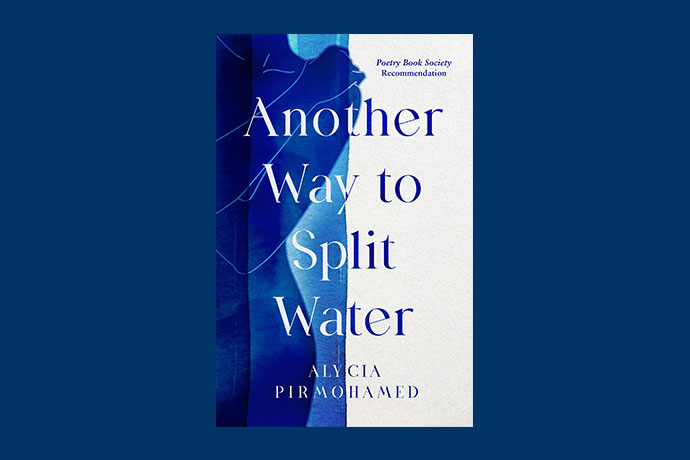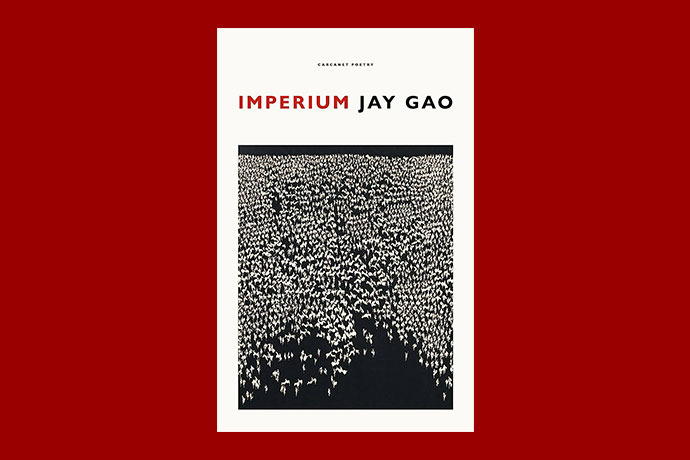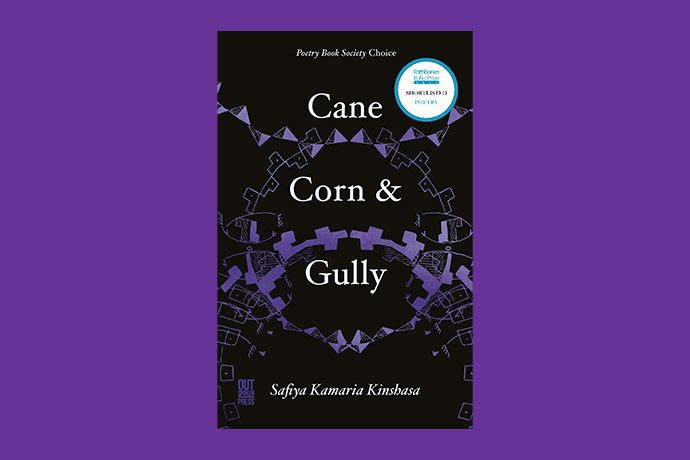Shalini Sengupta reads three new poetry collections by Alycia Pirmohamed, Jay Gao, and Safiya Kamaria Kinshasa.
On Another Way to Split Water by Alycia Pirmohamed
1. How do the words get to the page? 2. What attracts them? 3. What did you burn? 4. What did you give to the river?
These lines from Bhanu Kapil’s early prose-poem entitled ‘Burn This’ often come to my mind as I read Another Way to Split Water, Alycia Pirmohamed’s debut poetry collection that articulates the irreducible entanglement of language, the body, and water. Rich, vulnerable and multi-layered, the poems engage with the subject’s relation to water environments in a climactically and politically turbulent world. Water, here, is critical both thematically and formally. It is developed as a mode of relation and as a modulatory entity that encapsulates the fluid possibilities of poetic speech. Bodies of water, in Pirmohamed’s collection, are at once regional and migratory, connecting and distancing: in ‘Meditation While Plaiting My Hair’ they are ‘another translation for love’ while in ‘After the House of Wisdom’, a ‘basin of dark peaks’ that edge into ‘every / paragraph – every lexical formation’. Bodies of water are delineated as spaces of encounter through which questions of national and cultural identity are imagined and complicated, and linguistic boundaries are undone. Throughout, Pirmohamed’s voice remains observant and interrogative: adapting itself to dislocations and disorientations that arise for those who find themselves straddling multiple worlds.
In poems like ‘Prairie Storm’, water is yoked to language and the body, serving as a container for lived individual experience and collective memory. ‘The rain’, Pirmohamed writes, ‘knows how to fall in Gujarati.’ Water, here, serves as a metaphor for a longed-for sense of identity, and works to reconcile conflicting inheritances. The poems elaborate a poetics of water that contains ancestral memory and cultural heritage, capturing the double function of language as both movement and root. Pirmohamed’s modes of thinking are by nature fluid and cyclical, and the continuous modulation of text serves to include the reader within its ambit.
In ‘Hawwa Is Creating Her Garden’, we’re invited to ‘[l]ook closely // at the tasbih beads’, to meditate on the finer detail. In ‘Midnight Vessel Across the Great Sea’, we are asked to attune ourselves to the movements of the lyric ‘I […] a remembrance’ that glides like a ‘reed a silhouette of green / across the great sea’ and breaks the ‘skin memory of water.’ Later poems – particularly the four-poem series titled ‘You Know It but It Don’t Know You’ – require us to think of the dialectics of connection and separation, dissolution and resistance through the refractive properties of water. The formal patterning of these poems on the page – Pirmohamed’s bare irregular lines and use of strikethroughs, repeated in a flurry of speaking over and crossing out – work consciously to destabilise meaning and content. Voice, for Pirmohamed, isn’t a straightforward concept. In part IV. of the series it ‘unravels / its / cacophony // across / time’ like ‘the great sea’: it ‘unravels / its invisible sheaves’ like a ‘body of water’ and works to honour the plurality of the speaker’s inherited memory.
The collection proposes a prismatic, embodied contemplation of departure and return – and remaining – that locates itself within a contemporary, intercultural, and eco-critical framework. Pirmohamed’s debut refracts the meaning of identity, diaspora, intergenerational memory and storytelling, into language that makes you feel and intuit, rather than process solely through intellect.
You can order Another Way to Split Water by Alycia Pirmohamed (US: YesYes Books/UK: Polygon) here.
On Imperium by Jay Gao
Bold and ambitious, Jay Gao’s Imperium demonstrates the eruption of a singular voice and wit. Gao’s peripatetic lyric ‘I’ encourages – much like Pirmohamed’s fluid subjectivity – modes of expression that capture disorientations within language and identity in flux. Reading them collectively for their shared politics allows the reader to engage critically with the in-between spaces of relation between language and thought; self and the environment; self and other.
Imperium reimagines Homer’s Odyssey through the lens of an acerbic, though often weary traveller, who moves through hotel bars and tourist spots. Gao’s unforgettable vignettes in the collection work to expose the inadequacies of nomadism and the often-exploitative underbelly of travel that imperialism leaves behind in its wake. From the very outset, the collection mobilises walking practices as modes of thought and expression. ‘I wanted to end’, Gao writes, ‘by walking backwards, trace / slower circles in my back garden; in the distance’ (‘Hero Worship’). Attention is paid to walking as the poetic subject’s mode of unfolding stories, and brings into question current realities.
The collection radiates outward to encompass references to the classical as well as the contemporary. Gao’s voice leans heavily on the Western canon – poets who range from Homer, Ovid, Sappho to Paul Celan and H.D. – as well as on perspectives that come from other parts of the world with their own aesthetic signatures. References to Achille Mbembe and Wong Kar-Wai enact this linguistic attention, along with subtler nods to the archipelagic poetics of Caribbean writers like Kamau Braithwaite and Edouard Glissant. ‘Archives,’ the poetic voice admits, ‘must be rewritten from time / to time’ (‘Beeswax’). Sequences like ‘Body Sonnet’, give the impression – through its layout and formal patterning – of letting language fall where it will, to express feeling. Gao’s experiments with algorithmic poetry scrambling in these sequences mark a wider conceptual negotiation between historical tradition and innovation. Here and elsewhere, the poems assert their own mind and request readings on their own terms, as Gao expands formal circumscriptions and conceptual borderlines. The ‘Body Sonnet’ sequences also appear as exercises in compression and sparseness, with poems that run on for one or two lines and bewilder with their intrinsic brevity. But ‘[o]missions are not accidents’, as Marianne Moore famously reminded her readers in the defying opening to the 1967 Complete Poems. Imperium’s linguistic acrobatics similarly draw strength from the range, risk and innovation of the poet’s work. The project is borne aloft by Gao’s capacious imagination and his lyrical as well as formal diligence.
Writing, in Gao’s collection, is not arriving: a motif that narratively complicates ideas of origin; the myth of home(coming); and concepts like strangeness and nostalgia. To write, Gao’s work implies, is to go on foot and with the body: it is to wander and wear out and play with errancy and what that might signify. But how far must one not arrive in order to write? What does it mean to order one’s poetry into spaces that, as Gao memorably describes, are not ‘filled in with tradition’ (‘Body Sonnet, V.’)? The collection poses these questions to the reader: one who is invited to engage with the poems spatially as well as sensually. Gao’s debut emerges as an unforgettable read in these changing and pluralistic times.
You can order Imperium by Jay Gao (Carcanet) here.
On Cane, Corn & Gully by Safiya Kamaria Kinshasa
Formally and tonally subversive, Cane, Corn & Gully – Safiya Kamaria Kinshasa’s genealogical and autobiographical collection – invests in a language that reimagines the Caribbean female body and its everyday movement as choreography and aesthetic. Her mighty poetic project reckons with the violence inflicted (historically and currently) on the Black female body and the imbrication of ‘liberation & violation’ (‘Phrase 18’). The poet exposes dance’s violent ground by unearthing hidden forms of racial violence – as well as spatial and psychic operations of imperial and colonial subjection – through performance. Incisive and original, the collection roots Afro-diasporic dance and choreographic meaning in the politics of space, gender and race.
The collection begins with Kinshasa’s gut-pummelling poem, ‘I Tied My Teeth to My Feet & Ate My Own Testament’ that unfurls intergenerational trauma: ‘a man broke my grandmother’s jaw with headlice / she turned tuh sweetgrass & goatskin / i squashed my fingers in my stomach stuffed in a bucket’. Kinshasa’s words – plainspoken yet luminous – refract the meaning of female subjugation or gendered and racialised violence into something beyond words: something that presses down on the reader’s lungs every time we read this work. Her collection offers movement as a challenge to the binarised oppositions between essentialized presence and absence, identity and difference. Poems such as ‘Preface: And if by Some Miracle’ speaks with displaced and forgotten lives – voices of the past –who are brought back by the incantation of dancehall rhythms and Kinshasa’s use of dialect to form living presences in the absence of justice. ‘Sometimes,’ she writes in the same poem, ‘I traced texts just to find an utterance, but / they were not speaking. And to my devastation, I could not / find a single word from an enslaved woman in Barbados.’
Throughout the collection, Kinshasa’s poems seem to store wounded histories and the scars of this accumulated bodily experience. They reckon with the chronic and ongoing subjugation – indeed, the trauma – of Black women in social and economic systems that variously fetishize, debase, destroy, and erase them. It feels important to note that Kinshasa’s work with live language, and her performance-led poetry, demonstrates the manner in which the intimate territory of the body is interrupted and administered by these very systems. Body-language, movement, and breath work shapes her performance, and alerts us to the ways in which the poet works and reworks the white-hot stuff of the poem through the physical intensity of performance, before it is finally ready to cool on the page. More remarkable yet, is how Kinshasa also manages to suffuse her collection with hope and militant tenderness: ‘we must stay low & positive, sing. / morning cannot wipe the sweat from our brows’ (‘Sometimes Death Is a Child Who Plays With Rubber Bands’). This is a fearlessly original exploration: one that promises to set bodies in hopeful and reparative motion while commenting on the social conditions through which groups of people are held in place or forcibly displaced.
Kinshasa’s collection exists in various forms fusing dance, storytelling, lyric verse and spoken-word in innovative and thoroughly refreshing ways that feel searching and deeply captivating. It gives us the sense that the lives she depicts are nuanced and open to different possibilities, and – at the same time – pushes the category of poetry into new and interesting places. She animates the collection with a dexterously controlled torsion between form, narrative, and affect. This is a book that challenges us to see poetry as more than what exists solely on the page.
You can order Cane, Corn & Gully by Safiya Kamaria Kinshasa (Out-Spoken Press) here.
–
Dr. Shalini Sengupta is a postdoctoral researcher at the University of Vienna, where she works on an ERC/FWF-funded project titled ‘Poetry Off the Page’. She earned her PhD from the University of Sussex, UK, in 2021. Her academic writing has appeared/is forthcoming with Modernism/modernity Print Plus; Journal of British and Irish Innovative Poetry; Presses Universitaires de La Méditerranée; Etudes Anglaises; and Bloomsbury Companion to Contemporary Poetry in Ireland and the UK. Her public writing has appeared in Poetry London; Poetry Wales; magma poetry; Poetry Book Society; and Versopolis.



Add your Reply
You must be logged in to post a comment.